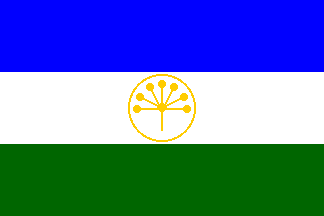
image by António Martins and Ralf Stelter, 20 May 2000

Last modified: 2014-08-30 by zoltán horváth
Keywords: bashkortostan | bashkiria | party | kurai | pleurospermum uralense | seven | error | baŝk̂ortostan |
Links: FOTW homepage |
search |
disclaimer and copyright |
write us |
mirrors

image by António Martins and Ralf Stelter, 20 May 2000
(Note: You need an Unicode-aware software and font to correctely view the cyrillic text on this page. See here transliteration details).
Law About the State symbolics of the Republic of Bashkortostan
of 6 July 1999 No. 10-z was effectively amended 12 February 2003 (Law No.
466-z About the introduction of amendments in the Law of the Republic of
Bashkortostan About the State symbolics of the Republic of Bashkortostan).
The proportions of the flag were changed to 2:3, the
other measures (size of the central device) remained untouched.
Antonio Gutiérrez, 25 Jun 2006
On 25 February 1992 the local Soviet approved another flag [different
from the 1990 proposal], with the same colors in a
different order (skyblue - white - green) and a golden flower in a white
circle. The flower is called kurai, the Bashkor
rose, which grows only in that region and it is used to make musical
instruments. It has seven petals for the seven tribes.
Giuseppe Bottasini, quoting
[zig94]
The emblem is in gold lines and has complete measures
given in the law.
Ralf Stelter, 25 Jul 1999 and 27 Jul 1999
The Law of 1999 stipulates that the emblem «must appear on both
sides of the flag», which perhaps indicates that it was supposed to
but sometimes didn’t?
Christopher Southworth, 30 Jun 2003
Is not entirely possible that the legislation of 1999 was intended to
resolve the conflicting requirements of the 1992 law and regulations (the
results of which were reported on by Ralf — before any new law
would have had time to take effect)? According to English translations, the
legislation calls simply for blue and regulations issued on the same date
for sky blue.
Christopher Southworth, 30 Jun 2003
The Bashkir Republic law О
государственной
символике
Республики
Башкортостан
(About the state symbolics of Republic Bashkortostan), of 2000.12.13,
is at the official
website.
António Martins, 16 Sep 2005,
quoting Christopher Southworth
The flower in the center of the flag is a traditional Bashkir flower called
"Kurai" and is regarded here as a symbol
of friendship. Its seven petals on the flag represent the original seven
tribes (families) who laid foundation for consolidating the peoples of
Bashkortostan on its territory.
Rafael Zinurov (Head of the Department of Inter-Ethnic
Relations and International Contacts of the Supreme Soviet
of the Bashkortostan Republic), 1992, quoted by Chrystian Kretowicz,
17 Feb 2002
According to the book Winds of Change
[r4f96], the ratio of the flag is 1:2.
the upper, middle and lower stripes each account for one-third of the flag
width, the circle in the centre of the flag makes up one-eighth of the
length or one-quarter of the flag width.
Christopher Southworth, 30 Jun 2003
The only source I could find supporting light blue is
[zig94], possibly mistaken
or outdated. All other sources, including the flag law,
state simply blue.
António Martins, 20 May 2000
The bashqort national flag is blue/white/green — where the blue
is a standard light and clear blue, not specially dark or turquoise.
The bashqort flag colors is more or less exactly as in
the Aspirant chart.
HG the Kakadu, 28 Jun 2003
The word used in the law text is
"синный", which indeed is
the same word as the one in the law prescribing the flag of the
Federation of Russia.
It is supposedly a medium blue (![]() ); the translation to
«dark blue», caused by the existence of the word
"голубой" (meaning
"light blue") is misleading, in my opinion.
); the translation to
«dark blue», caused by the existence of the word
"голубой" (meaning
"light blue") is misleading, in my opinion.
António Martins, 06 Nov 2003
According to the book Winds of Change
[r4f96],
the Law On the National Flag of the Republic of Bashkortostan
dated 25 February 1992 (Article 2), and Constitution of 24 December 1993
(Article 158) both simple state «blue, white and green»
with the Kurai flower (with seven petals) as
«gold». The Regulations of 25 February 1992 (Article 1) says,
however, «sky blue».
Christopher Southworth, 30 Jun 2003
The green is dark green, close to the color of
Adygeja («dark
aquamarine»: ![]() ),
although the law only describes "green".
),
although the law only describes "green".
Ralf Stelter, 25 Jul 1999 and 27 Jul 1999
An official
flag photo on-line [link broken as of 01 Dec 2005] shows rather
very dark green (![]() ), as also at the unofficial site
Vatandash.UfaNet.RU, while
the official web site, contradicting the refered flag photo,
shows a flag
image with normal or even pale green.
), as also at the unofficial site
Vatandash.UfaNet.RU, while
the official web site, contradicting the refered flag photo,
shows a flag
image with normal or even pale green.
António Martins, 11 Dec 2002
The bashqort national flag is blue/white/green — where the
green is a standard light and clear green
(![]() ), not specially dark or turquoise
or olive. The bashqort flag colors is more or less exactly as in
the Aspirant chart.
), not specially dark or turquoise
or olive. The bashqort flag colors is more or less exactly as in
the Aspirant chart.
HG the Kakadu, 28 Jun 2003
From the Soviet Encyclopedia, volume 24 page 78 (my translation):
Kurai is an excellent feed for camels and other livestock in the spring. Is used also as a winter feed, stored in silos. Ground into flour, kurai can be used in multi-feeds. Contains 5 % of proteins. In some places, kurai is used for fuel. Ashes contain high quality salts and are used often for manufacturing of crude soaps.The article above this one describes kurai as a Bashkir national musical instrument, sort of flute.
"Kurai" is the Bashkir name while the Latin name of the plant is
Pleurospermum uralense Hoffm. Unfortunately English name is unknown to
me. This plant is rather common in the area I am from and still used for making
a national music instrument which sounds very nice.
Irina Teplova (bashkir biologist), 2001,
quoted by Marcus Schmöger, 31 Jan 2002
The plant in the Bashkir flag always resembled an Apiaceae plant to me.
This family (also known as Umbelliferae) contains, inter alia, such well-known
plants as carrot or caraway. They are not closely related either to
Salsola kali (Chenopodiaceae) or
Phragmites communis (Poaceae, grass family).
Marcus Schmöger, 31 Jan 2002
A related species, Pleurospermum austriacum, can be found in Austria.
Here’s an image of its inflorescence
(flowers).
Marcus Schmöger, 31 Jan 2002
Aldo Ziggiotto, on his 1994 book [zig94]
says the «flower is called kurai (Phragmites communis
Trin.)» I always doubted it, actually (being a biologist), as
Phragmites communis is a very common plant (reed) all over Europe and
beyond, and definitely not growing only in Bashkiria. Furthermore the flower
on the flag doesn’t look like the flower of Phragmites.
Marcus Schmöger, 31 Jan 2002
I came across the article by Smith [smi92o].
He writes: «This reed, which grows only in Bashkortostan».
While Ziggioto [zig94] writes: «è
quello di una canna scientificamente chiamata Phragmites
communis». I suspect, that an ambiguity in Smith’s text together
with a translation ambiguity led to the "Phragmites communis".
The term "reed" is not really appropriate in this context, as in a
strict sense it means indeed Phragmites communis, and similar plants,
i.e. tall grasses, but never a tall plant belonging to the Apiaceae (carrot
family). So a first mistake was made by Smith. If you translate "reed"
into Italian, you come up with "canna". However, this term seems
to have a broader sense, including sugar-cane and (walking) cane. Ziggioto
obviously took the "reed" in Smith’s text very literally, as the
most common "reed" is "Phragmites communis". This is
only speculation on my part; I don’t know, if it wasn’t perhaps the
other way round: Ziggioto had some (wrong) information, that he gave to Smith
first and then used in his own article. Smith, uneasy about "Phragmites
communis", just left this part out, and only used the term
"reed".
Marcus Schmöger, 17 Feb 2002
Alfred Znamierowski, in [zna99], claims
the flower is Salsola kali, which is even weirder.
Marcus Schmöger, 31 Jan 2002
That comes most likely from the Soviet Encyclopedia, volume 24 page 78 (my translation):
KURAI - name of several semi-desert and desert plants of the saline genre (Salsola ruthenica, Salsola kali) and of camel-like genre (Corispermum). It belongs to the ground-cover (crawling) group.Chrystian Kretowicz, 17 Feb 2002

This flag, with medium blue,
light green and voided stamens,
is listed under number 119 at the chart Flags
of Aspirant Peoples [eba94] as:
«Bashkortostan (Bashkirs) - West Siberia».
Ivan Sache, 15 Sep 1999
Would this have any thing to do with the (doubtful, reported)
unofficial flag of neighbouring Chelyabinsk
region in 1992-1993?…
António Martins, 11 Oct 2002

Correct image of the flag have the flower longstalked and
encircled in a ring. All other images are wrong!
In early 1990ties german-czech vexillologist Roman
Klimeš published in czech Vexilologie
[vex] the image of Bashkirian flag without
ring; later they corrected the image. But this version (without circle)
was copied by many magazines and web-sites. In Ufa (capital of Bashkiria)
I saw a flag without circle one time. It was image on police car. But the
image was hand-made, and a flower was very big (approx. equal to
flag-height). All real flags are with circle.
Victor Lomantsov, 12 Dec 2002
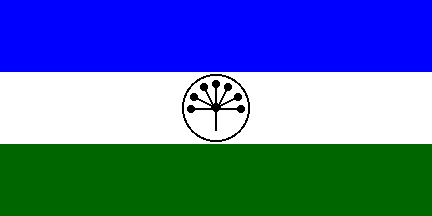
This picture shows the proposal never adopted.
Ralf Stelter, 27 Jul 1999
>> Projects were most varied: it was proposed to place on the flag sickle >> and hammer
 Viktor Lomantsov
Viktor LomantsovViktor's image is 2:3, which I kept, but puts the h&s much smaller than in the Soviet flag. I kept the regular h&s size. Is this correct? Are actual images of this proposal known, or just descriptions?
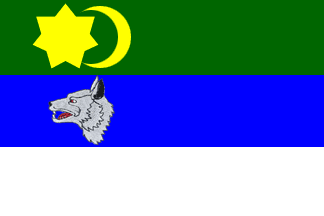 António Martins-Tuválkin, 17 Apr 2007
António Martins-Tuválkin, 17 Apr 2007
>> the head of wolf - a Bashkir totem, star and the likeViktor's image is 2:3, and has the blue stripe in the middle.
>> (above they were given several figures, published in article M. V. >> Revnivcev in the Czech bulletin "Vexillologie"). >>
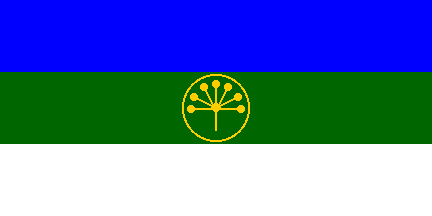 António Martins-Tuválkin & Ralf Stelter, 17 Apr 2007
António Martins-Tuválkin & Ralf Stelter, 17 Apr 2007
>> The greatest support was obtained blue-green-white flag with the >> addition in the center of the green stripe of a _kurai_ flower,Viktor's image is 1:2.
I note that no explicit reference is made to the flag with black _kurai_ on middle white stripe, as reported above.
>> but in November 1991 the republic of the Komi accepted a similar flag, >> and in order not to repeat its flag Bashkir deputies decided to change >> the order of the strips of national flag.António Martins-Tuválkin, 17 Apr 2007

A first flag appeared on 11 October 1990: it was the one of Bashkor
Popular Party, with three horizontal strips: skyblue (for Turkish people),
green (Islam) and white (purity).
Giuseppe Bottasini, quoting
[zig94]
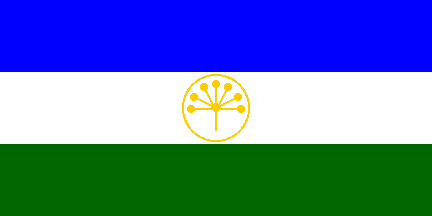
According to Geraldika.RU,
the flag of the Republic of Bashkortostan will be 2:3 in the
future instead of 1:2. It seems that the standard ratio for (territorial?)
flags in Russia shall be 2:3 like the
Federal Russian flag. The MPs adopted amendments
in the Law aboout the State symbolic of Bashkortostan. Those amendments were
approved by the two chambers of the parliament and this shall be approved by
the bashkir president. The problem is that all the Bashkir flags will have
to be changed. this will need some time.
Pascal Vagnat, 30 Jan 2003
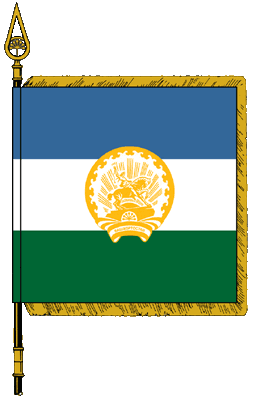
The simplest variants of standards are accepted in Republics. This
imposing of the arms on a national flag.
Such symbols have heads of Republic Bashkiria.
Sergey Filatov, 10 Oct 2005
Most of these flags are squarish (about 11:12),
rigid and fringed variants of the region (Governors) or Republic (Presidents)
flags with the regional emblem over all.
António Martins, 02 Oct 2005
The Decree
Of The President Of Republic Bashkortostan
About Standart Of The President Of Republic BashkortostanThe appendix
To the Decree of the President
of Republics Bashkortostan
From August, 21, 2000 NºUP-498The Description And Figure Of Standart (Flag)
Of The President Of Republic BashkortostanStandard (flag) of the President of Republic Bashkortostan represents a square panel from three equal horizontal stripes: top — dark blue, average — white and bottom — green color (color of the national Flag of Republic Bashkortostan). In the centre — the gold image of the State Emblem of Republic Bashkortostan, a panel is bordered by a gold fringe.
The staff standard (flag) is topped overhead, representing a metal ornament of the golden color, having the flat, dome-shaped form extended up in which centre there is a stylized Kuray flower, consisting of seven petals.
translated by Sergey Filatov, 10 Oct 2005
.gif)
Image of the arms at the
official website.
António Martins, 16 Sep 2005,
quoting Christopher Southworth
Note the scroll/ribbon patterned after the flag, with
the inscription
"БАШҠОРТОСТАН"
(the "K" with a tick backwards shows that the inscription is in
Bashkir). Note that the stylized kurai flower
shows also on the arms.
António Martins, 11 Dec 2002
The kurai flower as shown in the
emblem makes me think that the
incorrect version of the flag showing a large flower
with no ring and short stem is inluenced by its representation in the base
of the emblem. (Similar situations have ocurred for
Chuvashia and
Tadjikistan.)
António Martins, 16 Sep 2005